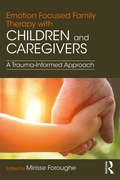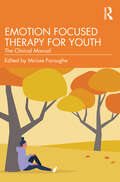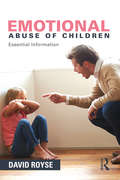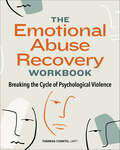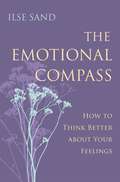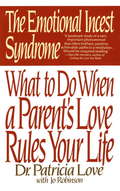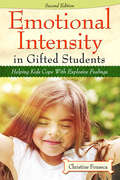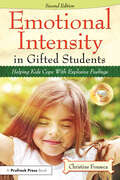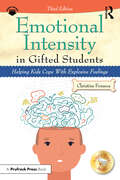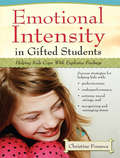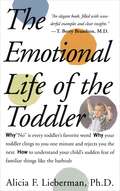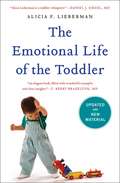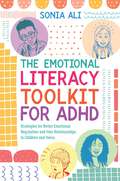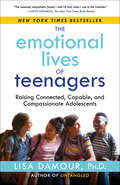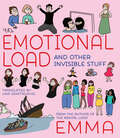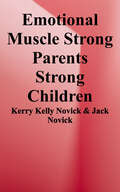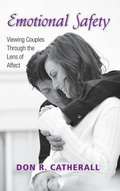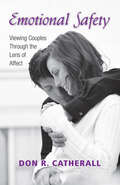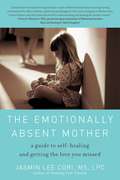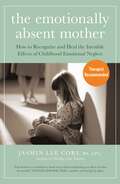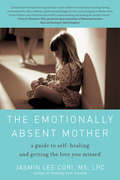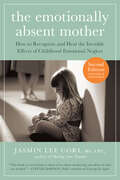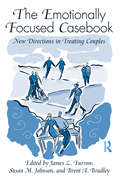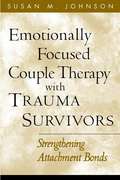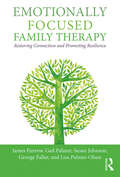- Table View
- List View
Emotion Focused Family Therapy with Children and Caregivers: A Trauma-Informed Approach
by Mirisse ForougheThis book introduces emotion focused family therapy (EFFT) as an evidence-based intervention for children through the integration of parent trauma treatment and emotion-focused techniques. A team of expert authors, including the founders of EFT and EFFT, contribute to the chapters, in which recent findings from longitudinal clinical trials are woven into a rich and deeply presented overview of using EFFT practically with clients. This immensely practical book also provides illustrative case studies, intervention strategies, and do’s and don’ts at the end of each chapter.
Emotion Focused Therapy for Youth: The Clinical Manual
by Mirisse ForougheThis edited collection is the first book of its kind to apply the theory, research, and teaching of Emotion Focused Therapy to youth and their families, equipping clinicians and students with the practical skills to facilitate individual, dyadic, and parent sessions confidently. Mirisse Foroughe is joined by an impressive group of internationally acclaimed contributors, including clinician-scientists and scholars, as well as the developer of Emotion Focused Therapy, Dr. Leslie Greenberg. This clinical manual offers a trauma-informed perspective on how to apply EFT for primary care of youth as well as more complex mental health difficulties. The manual begins with an incredibly user-friendly overview of core EFT principles before moving onto clinical applications with individual youth, parents, and dyads. The contributors then address how EFT can be implemented with specific client populations, such as youth with anxiety, depression, and borderline personality disorder, before examining important considerations that clinicians should bear in mind when working with parent and youth trauma and complex clinical presentations. Interweaving a trauma-informed perspective throughout, the manual is filled with practical summary tables, helpful tips, and eye-catching illustrations to ensure it is useful for students and experienced therapists. Emotion Focused Therapy for Youth is essential reading for marriage and family therapists, clinical social workers, and other mental health professionals working with youth and their families.
Emotional Abuse of Children: Essential Information
by David RoyseChildren and Emotional Abuse is a research-informed learning resource for students in social work about the dynamics and consequences of psychological abuse—especially as it occurs in dysfunctional families and affects children and adolescents. Emotional abuse is still not widely understood or recognized. Helping professionals need to recognize emotional abuse, understand the damage it does, the theories that account for it, and be prepared to help children and families where the abuse often occurs along with physical and sexual abuse. This text will draw upon current peer-reviewed literature and evidence-based studies and summarize essential information to prepare students for careers in helping professions. Each chapter will also contain brief vignettes to illustrate some of the key points. This book is for courses in child welfare and child abuse/neglect, as well as other social work courses that focus on children.
The Emotional Abuse Recovery Workbook: Breaking the Cycle of Psychological Violence
by Theresa ComitoMove your life forward with this workbook for healingMove away from harmful personal and professional relationships, and instead, toward recovery and growth. This accessible workbook will help you identify and acknowledge abuse, validate your feelings, practice self-care, set boundaries, create a safety plan, examine healthy relationships, and design your exit plan.The Emotional Abuse Recovery Workbook offers ways to work through your trauma, leading you through the process of awareness, understanding, and healing. Engaging exercises steer you to look inward and examine and navigate relationships, while keeping your health and safety a priority. You'll identify your strengths and values, work out strategies to manage daily challenges, discover your resilience, and promote improved self-worth and a sense of well-being.In this workbook you'll learn to:Identify emotional abuse—Begin to recognize, acknowledge, and understand the dynamics of emotional abuse, and start your recovery process.Take action—Move into guided examinations of your relationships. Make an exit plan with boundaries and safety nets to build new, healthier skills, and rediscover self-compassion and self-care.Move forward—Avoid repeating old patterns. Rebuild. Map out next steps into healthier relationships and greater independence while you enhance your network of supporters.Regain your freedom and sense of self with The Emotional Abuse Recovery Workbook.
The Emotional Compass: How to Think Better about Your Feelings
by Ilse Sand'Feelings are something we have, not something we are.' Revealing the complexity of emotions such as happiness, anger, fear, and jealousy, and how these are based on our perception of other people, Ilse Sand offers her professional wisdom on the psychology of feelings. Establishing that emotions are not always as appropriate as they first appear to be, the book encourages you to take a closer look at why you are feeling certain things, and how you can change how you feel. Especially written for highly sensitive people, guidance is included on how to identify the vulnerable feelings that often underlie our more volatile emotional states, and practical activities are suggested to help to embrace or reject sadness, delay impulsive actions, and allow yourself to be happy. Drawing on real-life examples throughout, the book offers you the means to improve your understanding of not only your own emotions and emotional actions, but those of others. The book will be immensely useful not only to people who feel things strongly, but to those who have trouble understanding or interpreting emotions and how to respond to the feelings they provoke.
The Emotional Incest Syndrome: What to Do When a Parent's Love Rules Your Life
by Patricia Love Jo RobinsonFrom Dr. Patricia Love, a ground-breaking work that identifies, explores and treats the harmful effects that emotionally and psychologically invasive parents have on their children, and provides a program for overcoming the chronic problems that can result.
Emotional Intensity in Gifted Students
by Christine FonsecaTeaching children how to manage their intense emotions is one of the most difficult aspects of parenting or educating gifted children. Emotional Intensity in Gifted Students: Helping Kids Cope With Explosive Feelings provides a much-needed resource for parents and educators for understanding of why gifted children are so extreme in their behavior and how to manage the highs and lows that accompany emotional intensity. Presented in an easy-to-read, conversational style, this revised and updated second edition contains additional chapters addressing temperament and personality development, as well as expanded role-plays and strategies designed to show parents and teachers how to interact and guide gifted children in a way that teaches them how to recognize, monitor, and adjust their behavior. Updated resources and worksheets make this practical resource a must-read for anyone wishing to make a positive and lasting impact on the lives of gifted children.
Emotional Intensity in Gifted Students: Helping Kids Cope With Explosive Feelings
by Christine FonsecaTeaching children how to manage their intense emotions is one of the most difficult aspects of parenting or educating gifted children. Emotional Intensity in Gifted Students: Helping Kids Cope With Explosive Feelings provides a much-needed resource for parents and educators for understanding of why gifted children are so extreme in their behavior and how to manage the highs and lows that accompany emotional intensity. Presented in an easy-to-read, conversational style, this revised and updated second edition contains additional chapters addressing temperament and personality development, as well as expanded role-plays and strategies designed to show parents and teachers how to interact and guide gifted children in a way that teaches them how to recognize, monitor, and adjust their behavior. Updated resources and worksheets make this practical resource a must-read for anyone wishing to make a positive and lasting impact on the lives of gifted children.
Emotional Intensity in Gifted Students: Helping Kids Cope With Explosive Feelings
by Christine FonsecaTeaching children how to manage their intense emotions is one of the most difficult aspects of parenting or educating gifted children. Emotional Intensity in Gifted Students is an indispensable resource for parents and educators seeking to understand why gifted children can be so extreme in their behavior and how to manage the highs and lows that accompany emotional intensity. Presented in an easy-to-read, conversational style, this revised and updated third edition pulls from contemporary research to depict changes in how we understand and support gifted children as well as an increased understanding of trauma, social-emotional learning, and empathy development. Chapters feature role-plays and strategies designed to show parents and teachers how to interact and guide gifted children in a way that teaches them how to recognize, monitor, and adjust their behavior. Also featuring updated resources, worksheets, and checklists, this practical new edition is a must-read for anyone wishing to make a positive and lasting impact on the lives of gifted children.
Emotional Intensity in Gifted Students: Helping Kids Cope With Explosive Feelings
by Christine FonsecaDesigned to provide support for the difficult job of parenting and teaching gifted children, "Emotional Intensity in Gifted Students: Helping Kids Cope With Explosive Feelings" provides the resource parents and teachers need to not only understand why gifted children are so extreme in their behavior, but also learn specific strategies to teach gifted children how to live with their intensity. Presented in an easy-to-read, conversational style, "Emotional Intensity in Gifted Students" uses real-world examples through case studies and role-plays that show parents and teachers how to interact with gifted children in a way that teaches them how to recognize, monitor, and adjust their behavior. Worksheets, tip sheets, and checklists are included to help parents, teachers, and the students themselves learn to cope with the explosive feelings that often accompany giftedness. Specific strategies for stress management, underperformance in school, perfectionism, and social anxiety make this a must-read for anyone wishing to make a positive lasting impact on the lives of gifted children.
Emotional Life of the Toddler
by Alicia F. LiebermanAny parent who has followed an active toddler around for a day knows that a child of this age is a whirlwind of explosive, contradictory, and ever-changing emotions. Many books cover the physical and cognitive abilities of the toddler, but Lieberman's is the first to offer an in-depth examination of the varied and intense emotional life of children from ages one to three. Drawing on her lifelong research, Dr. Lieberman addresses commonly asked questions and issues. Why, for example, is "no" often the favorite response of the toddler? How should parents deal with the anger they sometimes feel in the face of their toddler's unflagging obstinacy? Why does a crying toddler run to his mother for a hug only to push himself vigorously away as soon as she begins to embrace him? With the help of numerous examples and vivid cases, Lieberman answers these and other questions, giving us, in the process, a rich, insightful profile of the roller coaster emotional world of the toddler. Lieberman shows that the toddler is torn between the strong desire to remain close to the parent and the equally compelling drive to explore new and exciting surroundings. The author discusses how a child can be helped to achieve a balance between these conflicting desires, to feel both confident and outgoing as well as protected and comforted when necessary. Lieberman also provides fascinating new material on how children's different temperaments express themselves during the toddler years and how parents can better match their own temperaments to their child's. Particular attention is given to the shy child and the very active child at this age. In addition, Lieberman gives new insights on how best to handle common toddler problems, such as sleep disturbances, sibling rivalry, and temper tantrums. She also provides invaluable information on the normal anxieties of this age and how to recognize when anxiety is excessive, needing special attention. Finally, she gives us a fresh, insightful picture of how toddlers typically handle the stress of their parents divorce and outside child care, and provides sensitive practical advice on easing the toddler through these transitions. The Emotional Life of the Toddler is an invaluable resource for parents, clinicians, researchers, and child-care workers alike.
The Emotional Life of the Toddler
by Alicia F. LiebermanNow updated with new material throughout, Alicia F. Lieberman’s The Emotional Life of the Toddler is the seminal, detailed look into the varied and intense emotional life of children aged one to three. Hailed as “groundbreaking” by The Boston Globe after its initial publication, the new edition includes the latest research on this crucial stage of development.Anyone who has followed an active toddler around for a day knows that a child of this age is a whirlwind of explosive, contradictory, and ever-changing emotions. Alicia F. Lieberman offers an in-depth examination of toddlers’ emotional development, and illuminates how to optimize this crucial stage so that toddlers can develop into emotionally healthy children and adults. Drawing on her lifelong research, Dr. Lieberman addresses commonly asked questions and issues. Why, for example, is “no” often the favorite response of the toddler? How should parents deal with the anger they might feel when their toddler is being aggressively stubborn? Why does a crying toddler run to his mother for a hug only to push himself vigorously away as soon as she begins to embrace him? This updated edition also addresses twenty-first century concerns such as how to handle screen time on devices and parenting in a post-internet world. With the help of numerous examples and vivid cases, Lieberman answers these and other questions, providing, in the process, a rich, insightful profile of the roller coaster emotional world of the toddler.
The Emotional Literacy Toolkit for ADHD: Strategies for Better Emotional Regulation and Peer Relationships in Children and Teens
by Sonia AliChallenges with emotional regulation and rejection sensitivity can disproportionately affect children and teens with ADHD, impacting on their development at school and their relationship with their peers.Developed for children and young people who experience difficulties with emotional regulation, SEND specialist Sonia Ali, shares a mentoring Intervention programme to support a child or young person with this issue at school or at home. Covering concepts like the fight, flight or freeze response and the 'Window of Tolerance', managing anger outbursts and overwhelm or navigating conflict with peers, this easily digestible book will help educators and carers support children and teens to develop core emotional literacy skills in an enjoyable way!This accessible, step-by-step guide is packed with activities, including role-play situations, discussion-based statements, quizzes and more. The programme can be followed sequentially or 'dipped into' to support a child with a particular issue when relevant.
The Emotional Lives of Teenagers: Raising Connected, Capable, and Compassionate Adolescents
by Lisa Damour Ph.D.NEW YORK TIMES BESTSELLER • An urgently needed guide to help parents understand their teenagers&’ intense and often fraught emotional lives—and how to support teens through this critical developmental stage—from the author of Untangled and Under PressureDr. Lisa Damour worked as an expert collaborator on Pixar&’s Inside Out 2!&“How are we supposed to get our kids through these daunting years? There are countless books on the subject, but The Emotional Lives of Teenagers is the nuanced, empathetic one I wish I&’d had when I was in the trenches.&”—Judith Newman, The New York Times Book ReviewIn teenagers, powerful emotions come with the territory. And as teens contend with with academic pressure, social media stress, worries about the future, and concerns about their own mental health, it&’s easy for them—and their parents—to feel anxious and overwhelmed. But it doesn&’t have to be that way.Parents who read this book will learn:• what to expect in the normal course of adolescent emotional development and when it&’s time to worry• why teens (and adults) need to understand that mental health isn&’t about &“feeling good&” but about having feelings that fit the moment, even if those feelings are unwanted or painful• strategies for supporting teens who feel at the mercy of their emotions, so they can become psychologically aware and skilled at managing their feelings• how to approach common challenges that come with adolescence, such as friction at home, spiking anxiety, risky behavior, navigating friendships and romances, the pull of social media, and many more• the best ways to stay connected to their teens and how to provide the kind of relationship that adolescents need and wantWith clear, research-informed explanations alongside illuminating, real-life examples, The Emotional Lives of Teenagers gives parents the concrete, practical information they need to steady their teens through the bumpy yet transformational journey into adulthood.
The Emotional Load: And Other Invisible Stuff
by EmmaThe author of The Mental Load returns with more "visual essays which are transformative agents of change."After the success of The Mental Load, Emma continues in her new book to tangle with issues pertinent to women's experiences, from consent to the "power of love," from the care and attentiveness that women place on others' wellbeing and social cohesion, and how it constitutes another burden on women, to contraception, to the true nature of gallantry, from the culture of rape to diets, from safety in public spaces to retirement, along with social issues such as police violence, women's rights, and green capitalism. And, once more, she hits the mark.
Emotional Muscle: Strong Parents, Strong Children
by Kerry Kelly Novick Jack NovickThis book offers parents, grandparents, teachers and all who work with children useful ways to build EMOTIONAL MUSCLE. Your child can develop emotional muscles, like trust and adaptability for babies, empathy and agency in one-year-olds, resilience and mastery in two-year-olds, assertion and persistence in three-year-olds, internal controls and realistic standards in four-year-olds, cooperation and competence in five-year-olds and more. With these added strengths, your child will become a good friend to others, a responsible helper, a self-motivated learner, and be successful in meeting life's challenges. Emotional Muscle creates character.
Emotional Safety: Viewing Couples Through The Lens Of Affect
by Don CatherallEmotional Safety is designed to help couple therapists identify and conceptualize the problems of their clients and to provide solutions, focusing on the two central elements of emotion and attachment. Problems occur in relationships when the partners no longer feel safe being open and vulnerable with each other. Emotional Safety: Viewing Couples Through the Lens of Affect enables couple therapists to recognize and articulate the emotional subtext of their clients’ interactions. The emotional safety model is based on modern affect theory and focuses on the affective tone of messages in the areas of attachment and esteem. The model allows therapists to address the subtle interplay of perceived threat and emotional reaction which underlies their clients’ difficulties and disrupts emotional safety.
Emotional Safety: Viewing Couples Through the Lens of Affect
by Don R. CatherallEmotional Safety is designed to help couple therapists identify and conceptualize the problems of their clients and to provide solutions, focusing on the two central elements of emotion and attachment. Problems occur in relationships when the partners no longer feel safe being open and vulnerable with each other. Emotional Safety: Viewing Couples Through the Lens of Affect enables couple therapists to recognize and articulate the emotional subtext of their clients’ interactions. The emotional safety model is based on modern affect theory and focuses on the affective tone of messages in the areas of attachment and esteem. The model allows therapists to address the subtle interplay of perceived threat and emotional reaction which underlies their clients’ difficulties and disrupts emotional safety.
The Emotionally Absent Mother: A Guide to Self-Healing and Getting the Love You Missed
by Jasmin Lee CoriWas your mother too busy, too tired, or too checked-out to provide you with the nurturing you needed as a child? Men and women who were undermothered as children often struggle with intimate relationships, in part because of their unmet need for maternal care. "The Emotionally Absent Mother" will help you understand what was missing from your childhood, how this relates to your mother's own history, and how you can fill the mother gap by: - Examining the past with compassion for yourself and your mother Finding the child inside of you and learning to mother yourself -Opening to the archetype of the Good Mother -Allowing friends and loved ones to provide support, guidance, and other elements of good mothering that you missed Through reflections, exercises, and clear explanations, psychotherapist Jasmin Lee Cori helps adult sons and daughters heal the wounds left by mothers who failed to provide the essential ingredients that every child needs. She traces perceived personal defects back to mothering deficits, relieving self-blame. And, by teaching today's undermothered adults to cultivate the mothering they missed, she helps them secure a happier future-for themselves and their children.
The Emotionally Absent Mother: How to Recognize and Heal the Invisible Effects of Childhood Emotional Neglect
by Jasmin Lee CoriTHE GROUNDBREAKING GUIDE TO SELF-HEALING, AND GETTING THE LOVE YOU MISSED'Years ago, I was on vacation and read The Emotionally Absent Mother. That book was one of many that woke me up... I began the process of reparenting and it's changed my life.' Dr. Nicole LePera, New York Times-bestselling author of How to Do the WorkWas your mother preoccupied or distant? Did she regularly demean you? Have you struggled with relationships - or with your own self-worth? Often, the grown children of emotionally absent mothers can't quite put a finger on what's missing from their lives. The children of abusive mothers, by contrast, may recognize the abuse - but overlook its lasting, harmful effects.Psychotherapist Jasmin Lee Cori has helped thousands of women and men heal the hidden wounds left by every kind of undermothering. In the second edition of this pioneering book, with compassion for mother and child alike, she explains:- Possible reasons your mother was distracted or hurtful - and what she was unable to give- The lasting impact of childhood emotional neglect and abuse- How to find the child inside you and fill the 'mother gap' through reflections and exercises- How to secure a happier future for yourself - How to break free from the pattern of neglect and abuse with children you have now or may have in the future.
The Emotionally Absent Mother: A Guide to Self-Healing and Getting the Love You Missed
by Jasmin Lee Cori MS, LPCWas your mother too busy, too tired, or too checked-out to provide you with the nurturing you needed as a child? Men and women who were “undermothered” as children often struggle with intimate relationships, in part because of their unmet need for maternal care. The Emotionally Absent Mother will help you understand what was missing from your childhood, how this relates to your mother’s own history, and how you can fill the “mother gap” by:Examining the past with compassion for yourself and your motherFinding the child inside of you and learning to mother yourselfOpening to the archetype of the Good MotherAllowing friends and loved ones to provide support, guidance, and other elements of good mothering that you missedThrough reflections, exercises, and clear explanations, psychotherapist Jasmin Lee Cori helps adult sons and daughters heal the wounds left by mothers who failed to provide the essential ingredients that every child needs. She traces perceived personal “defects” back to mothering deficits, relieving self-blame. And, by teaching today’s undermothered adults to cultivate the mothering they missed, she helps them secure a happier future—for themselves and their children.
The Emotionally Absent Mother, Second Edition (Second): How To Recognize And Cope With The Invisible Effects Of Childhood Emotional Neglect
by Jasmin Lee CoriThe groundbreaking guide to self-healing and getting the love you missed “Years ago, I was on vacation and read The Emotionally Absent Mother. That book was one of many that woke me up. . . . I began the process of reparenting and it’s changed my life.”—Dr. Nicole LePera, New York Times–bestselling author of How to Do the Work Was your mother preoccupied, distant, or even demeaning? Have you struggled with relationships—or with your own self-worth? Often, the grown children of emotionally absent mothers can’t quite put a finger on what’s missing from their lives. The children of abusive mothers, by contrast, may recognize the abuse—but overlook its lasting, harmful effects. Psychotherapist Jasmin Lee Cori has helped thousands of men and women heal the hidden wounds left by every kind of undermothering. In this second edition of her pioneering book, with compassion for mother and child alike, she explains: Possible reasons your mother was distracted or hurtful—and what she was unable to give The lasting impact of childhood emotional neglect and abuse How to find the child inside you and fill the “mother gap” through reflections and exercises How to secure a happier future for yourself (and perhaps for your children).
The Emotionally Focused Casebook: New Directions in Treating Couples
by Susan M. Johnson James L. Furrow Brent A. BradleyThere is currently no single resource that compiles the various applications to the many clinical populations being served by Emotionally Focused Therapy today. The Emotionally Focused Casebook fills that void as a substantive reference for clinicians, students, professors, and supervisors using and teaching EFT. Each chapter utilizes a hands-on case study approach with concrete guidelines and illustrations for the adaptation and application of EFT with specific treatment populations. This Casebook is the perfect practical resource for professionals and students looking for examples of specific theoretical, conceptual, and treatment applications of EFT.
Emotionally Focused Couple Therapy with Trauma Survivors
by Susan M JohnsonThis book provides a theoretical framework and an innovative model of intervention for distressed couples whose relationships are affected by the echoes of trauma. Combining attachment theory, trauma research, and emotionally focused therapeutic techniques, Susan M. Johnson guides the clinician in modifying the interactional patterns that maintain traumatic stress and fostering positive, healing relationships among survivors and their partners. In-depth case material brings to life the process of assessment and treatment with couples coping with the impact of different kinds of trauma, including childhood abuse, serious illness, and combat experiences. The concluding chapter features valuable advice on therapist self-care.
Emotionally Focused Family Therapy: Restoring Connection and Promoting Resilience (The Guilford Family Therapy Series)
by Gail Palmer George Faller Lisa Palmer-Olsen Susan Johnson James FurrowEmotionally Focused Family Therapy is the definitive manual for applying the effectiveness of emotionally focused therapy (EFT) to the complexities of family life. The book sets out a theoretical framework for mental health professionals to enhance their conceptualization of family dynamics, considering a broad range of presenting problems and family groups. The first section applies EFT theory and principles to the practice of family therapy. The second section explicates the process of EFT and examines the interventions associated with the EFT approach to families. In the final section, the authors provide case examples of emotionally focused family therapy (EFFT) practice, with chapters on traumatic loss, stepfamilies, externalizing disorders, and internalizing disorders. Integrating up-to-date research with clinical transcripts and case examples throughout, Emotionally Focused Family Therapy is a must-read for therapists looking to promote the development and renewal of family relationships using the principles of EFT.
